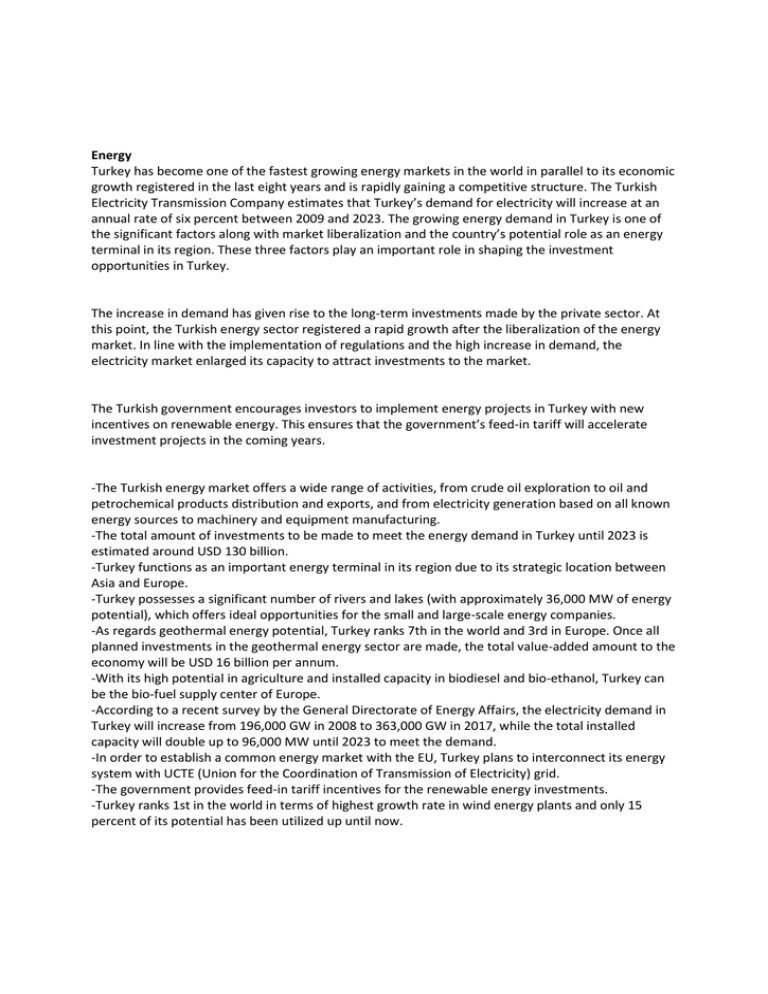Energy Turkey has become one of the fastest growing energy
advertisement

Energy Turkey has become one of the fastest growing energy markets in the world in parallel to its economic growth registered in the last eight years and is rapidly gaining a competitive structure. The Turkish Electricity Transmission Company estimates that Turkey’s demand for electricity will increase at an annual rate of six percent between 2009 and 2023. The growing energy demand in Turkey is one of the significant factors along with market liberalization and the country’s potential role as an energy terminal in its region. These three factors play an important role in shaping the investment opportunities in Turkey. The increase in demand has given rise to the long-term investments made by the private sector. At this point, the Turkish energy sector registered a rapid growth after the liberalization of the energy market. In line with the implementation of regulations and the high increase in demand, the electricity market enlarged its capacity to attract investments to the market. The Turkish government encourages investors to implement energy projects in Turkey with new incentives on renewable energy. This ensures that the government’s feed-in tariff will accelerate investment projects in the coming years. -The Turkish energy market offers a wide range of activities, from crude oil exploration to oil and petrochemical products distribution and exports, and from electricity generation based on all known energy sources to machinery and equipment manufacturing. -The total amount of investments to be made to meet the energy demand in Turkey until 2023 is estimated around USD 130 billion. -Turkey functions as an important energy terminal in its region due to its strategic location between Asia and Europe. -Turkey possesses a significant number of rivers and lakes (with approximately 36,000 MW of energy potential), which offers ideal opportunities for the small and large-scale energy companies. -As regards geothermal energy potential, Turkey ranks 7th in the world and 3rd in Europe. Once all planned investments in the geothermal energy sector are made, the total value-added amount to the economy will be USD 16 billion per annum. -With its high potential in agriculture and installed capacity in biodiesel and bio-ethanol, Turkey can be the bio-fuel supply center of Europe. -According to a recent survey by the General Directorate of Energy Affairs, the electricity demand in Turkey will increase from 196,000 GW in 2008 to 363,000 GW in 2017, while the total installed capacity will double up to 96,000 MW until 2023 to meet the demand. -In order to establish a common energy market with the EU, Turkey plans to interconnect its energy system with UCTE (Union for the Coordination of Transmission of Electricity) grid. -The government provides feed-in tariff incentives for the renewable energy investments. -Turkey ranks 1st in the world in terms of highest growth rate in wind energy plants and only 15 percent of its potential has been utilized up until now. Living in Turkey An increasing number of people from various parts of the world are moving to Turkey to start a new life, to work or even to find peace of mind for their retirements. The country has developed dramatically in the last ten years and the pace of progress in certain fields is nothing short of astonishing. For instance, while only 300 British nationals acquired real estate properties in Turkey in 2000, this figure exceeded 24,000 as of April 2009. Most of Turkey’s new residents hail from countries like the UK, Germany, Ireland, Denmark, the Netherlands, Norway, Austria, Belgium, France and the USA. With its unique geographical location combined with a rich and diverse history, right in the cradle of many different civilizations, Turkey is a privileged place to live for expatriates and their families. www.invest.gov.tr / January 2010



